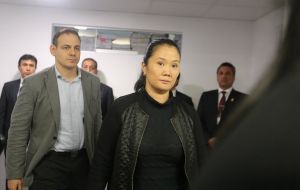MercoPress. South Atlantic News Agency
Parliamentary election in Peru that hopefully will cut the influence of Fujimorism
 President Martin Vizcarra dissolved parliament in September following constant clashes between the legislature and the executive that left Peru in a political crisis.
President Martin Vizcarra dissolved parliament in September following constant clashes between the legislature and the executive that left Peru in a political crisis.  It is expected that in the parliamentary elections Keiko Fujimori's populist right-wing party could lose dozens of its 73 seats in the 130-seat chamber.
It is expected that in the parliamentary elections Keiko Fujimori's populist right-wing party could lose dozens of its 73 seats in the 130-seat chamber. Peru will hold separate parliamentary elections for the first time on Sunday as President Martin Vizcarra looks to break the influence of the main opposition party of Keiko Fujimori.
Vizcarra dissolved parliament in September following constant clashes between the legislature and the executive that left Peru in a political crisis.
After parliament's objections were rejected by the constitutional court, a date was set for new parliamentary elections in which Fujimori's populist right-wing party could lose dozens of its 73 seats in the 130-seat chamber.
“The election winner is going to be Martin Vizcarra, because he will have managed to change the hostile Congress of the last few years,” political analyst Augusto Alvarez said.
Fujimori is expected to pay for being implicated in the wide-ranging Odebrecht corruption scandal that saw her spend 13 months in pre-trial detention until she was released in November.
Her Popular Force party has been the major bloc in parliament since the last elections in 2016 and even managed to force Vizcarra's predecessor Pedro Pablo Kuczynski - another politician embroiled in the Odebrecht scandal - from power in 2018.
But the daughter of jailed former president Alberto Fujimori has seen her popularity plummet. Her party's main allies in the legislature, the social-democrat APRA, have also been hurt by the corruption scandal.
APRA's ex-leader Alan Garcia, a two-time former president, committed suicide in April as police turned up at his home to arrest him for corruption related to the Odebrecht case.
Vizcarra dissolved parliament on Sep 30. The opposition accused him of a “coup d'etat” and swore in Vice-President Mercedes Araoz as “acting president” but she resigned the following day.
The opposition took its case to the constitutional court but it ruled in Vizcarra's favor. Protesters took to the streets in support of Vizcarra and his anti-corruption push and opinion polls showed 90% support for parliament's dissolution.
Other opinion polls ahead of the election suggest there could be a hung parliament with centrist parties expected to do well.
Vizcarra doesn't have a party himself but “will achieve a more bearable relationship with the centrist parties that achieve a majority in Congress,” said Alvarez. And he will need to as he requires legislative support for his anti-corruption reforms.
Corruption has been a major issue in Peru where four former presidents have been implicated in the Odebrecht scandal.
If centrists do dominate Congress, “Vizcarra won't have the same level of opposition that characterized his relationship with” the Fujimori-dominated legislature, said Alvarez.
The new parliament will sit for only 16 months with a general election set for April 2021, and the new government due to take office the following July.
Neither Vizcarra nor any of the new deputies will be eligible for re-election then, thus only 16 lawmakers are seeking re-election this time. There will be 2,300 candidates representing 13 parties, and for the first time there will be an indigenous trans candidate.
About 25 million Peruvians are eligible to vote but this campaign has been noticeable for voter apathy.
“The poll is to fill a void. The fall of the establishment and Fujimorism's loss of dominion means there's a clean slate in Peruvian politics,” analyst Carlos Melendez said
Popular Force may be defeated but it is expected to win the second largest number of votes behind the centrist Popular Action party. “It's hard to kill Fujimorism,” warned Melendez.
Alvarez said the party could come out with 25 legislators: “It will be a relevant force.”
The election will be observed by the European Union and Organization of American States.




Top Comments
Disclaimer & comment rulesCommenting for this story is now closed.
If you have a Facebook account, become a fan and comment on our Facebook Page!